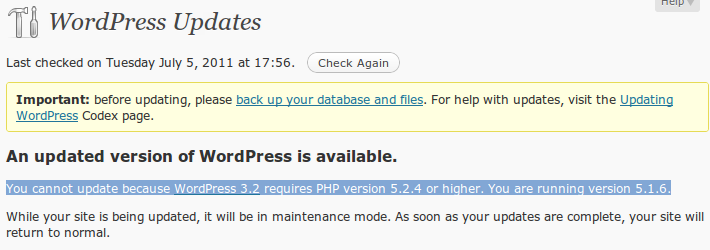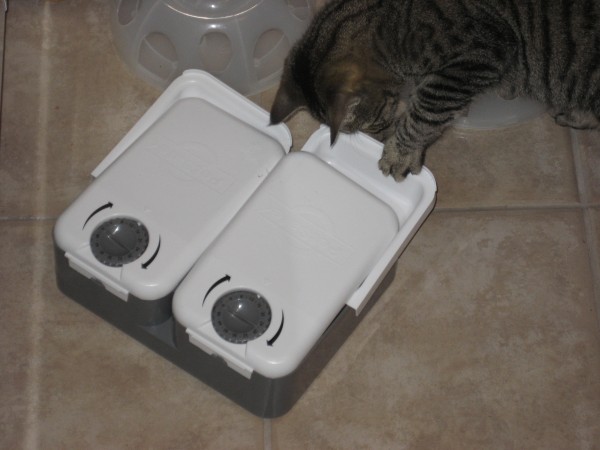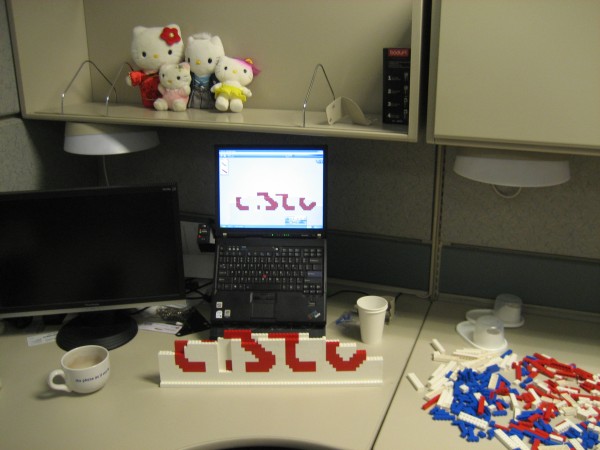Link:
https://dannyman.toldme.com/2011/08/09/oh-netflix/
Netflix has two awesome distinctive features going for it:
- It knows my taste enough to effectively recommend content.
- They do streaming and DVDs!
Right now I watch old TV shows on the streaming service, and maybe 1 DVD/month. For this I pay $10/month. That’s a good deal.
But now they want to cleave their business between DVD operations and streaming, and charge most customers more. Plenty of folks have gotten upset over this. Personally, I am irritated that they’re screwing the pooch on one of their distinctive features. What I had perceived as “hey, in order to satisfy our customers, we do DVDs and now we do streaming” now sounds more like “we want to be a streaming company but shipping DVDs is so expensive so we need to separate these different operations to keep the DVD taint off our streaming business!”
Which makes their distinctive feature list look like this:
- It knows my taste enough to effectively recommend content.
They do streaming OR they do DVDs.(Oh wait, that’s nothing special!)
Amazon.com offers me a bunch of “free” streaming through Prime and newer TV shows a la carte. I can get DVDs from the local library, not to mention any number of commercial outlets. I don’t need Netflix for only one or the other.
For my existing plan of 1 DVD at a time plus unlimited streaming, I pay $10/month. The new price for this same plan is to become $16/month. That’s a 60% increase.
I could go unlimited streaming only for $8/month. There goes the $2 extra I had been paying to watch the occasional DVD.
They do have a limited DVD plan for $5/month, but I called and confirmed that I can not combine that plan with unlimited streaming. That’s too bad, because $8 for unlimited streaming plus a few dollars more for limited DVDs is basically what I want.
So, for now, I am downgrading to their $5/month limited DVD plan. If Netflix wants to be a streaming-only provider they need to have way better streaming content. If Netflix wants to stick with their original plan of providing entertainment I like at an affordable price via the most cost-effective delivery option, then I look forward to signing up for an unlimited streaming plus limited DVD plan.
Feedback Welcome
Link:
https://dannyman.toldme.com/2011/08/03/heck-yeah-google-plus/

Feedback Welcome
Link:
https://dannyman.toldme.com/2011/07/25/one-word-autonomous-cars/
I don’t have a well-structured argument ready to post, but here’s a little rant I just made on IRC:
Danny: Talking to a guy at Google, he suggested that the plan is to introduce autonomous cars into an environment with less restrictive regulations.
Danny: I think autonomous cars are just a matter of time. Possibly the majority of new cars in 20 years, hopefully a lot sooner. The safety issue will become “why would you want a car controlled by fault-prone humans?”
Response: I expect there will be piles of social and political resistance.
Danny: Well the biggest resistance might be taxi drivers. That’s an effing industry in India. But I could picture the military going for it. “The road is mined and full of ambushes, yet the the supplies must go through. We can pay mad money for insane truck drivers or we can send robots.”
Danny: What interests me will be the impact on public transit. I think if cars can pick you up at your house, car ownership will drop, and people will use inexpensive autonomous car hires as the “last mile” connection to high-density transit services.
Danny: . . . the autonomous cars will happen. I swear that industry is like the Internet circa 1989. I would love to get a foot in the door! If Google nixed that program they are effing dunces–Like HP telling Steve Jobs that the PC is just a little too “out there.” I would buy the effing Apple I Autonomous Car Kit and install it myself.
Feedback Welcome
Link:
https://dannyman.toldme.com/2011/07/19/saq-corporate-communication/
Q: “What would help make communications more clear, simple, and transparent for you?”
A: I come from a startup culture, where the Fearless Leader will once a week stand up an a table and enthusiastically explain what new deals and products are in the pipeline, in terms his Grandma would understand. Then we drink cool-aid.
Compared to that, most corporate communication is Kremlinology.
Feedback Welcome
Link:
https://dannyman.toldme.com/2011/07/05/wordpress-upgrade-php53-centos/
If you have a self-hosted WordPress blog, you really ought to keep it up to date. Popular software is a popular security target, and as new exploits are discovered, new patches are deployed. Fortunately, WordPress makes this super-easy. Just go to Dashboard > Updates and you can update with one click. I basically get a free update any time I get it in my head to write something.
Except this morning, when I was told that an update was available, but:

On my CentOS VM, this was addressed by:
sudo yum update
sudo service httpd restart
Actually, it was a little difficult, because we’re replacing php with php53:
0-13:11 djh@www0 ~$ cat /etc/redhat-release
CentOS release 5.6 (Final)
0-13:11 djh@www0 ~$ rpm -q php
php-5.1.6-27.el5_5.3
0-13:11 djh@www0 ~$ yum list installed | grep ^php
php.x86_64 5.1.6-27.el5_5.3 installed
php-cli.x86_64 5.1.6-27.el5_5.3 installed
php-common.x86_64 5.1.6-27.el5_5.3 installed
php-gd.x86_64 5.1.6-27.el5_5.3 installed
php-mysql.x86_64 5.1.6-27.el5_5.3 installed
php-pdo.x86_64 5.1.6-27.el5_5.3 installed
1-13:11 djh@www0 ~$ sudo service httpd stop
Stopping httpd: [ OK ]
0-13:11 djh@www0 ~$ yum list installed | grep ^php | awk '{print $1}'
php.x86_64
php-cli.x86_64
php-common.x86_64
php-gd.x86_64
php-mysql.x86_64
php-pdo.x86_64
0-13:12 djh@www0 ~$ sudo yum remove `!!`
sudo yum remove `yum list installed | grep ^php | awk '{print $1}'`
Loaded plugins: fastestmirror
Setting up Remove Process
Resolving Dependencies
--> Running transaction check
---> Package php.x86_64 0:5.1.6-27.el5_5.3 set to be erased
---> Package php-cli.x86_64 0:5.1.6-27.el5_5.3 set to be erased
---> Package php-common.x86_64 0:5.1.6-27.el5_5.3 set to be erased
---> Package php-gd.x86_64 0:5.1.6-27.el5_5.3 set to be erased
---> Package php-mysql.x86_64 0:5.1.6-27.el5_5.3 set to be erased
---> Package php-pdo.x86_64 0:5.1.6-27.el5_5.3 set to be erased
--> Finished Dependency Resolution
Dependencies Resolved
================================================================================
Package Arch Version Repository Size
================================================================================
Removing:
php x86_64 5.1.6-27.el5_5.3 installed 6.2 M
php-cli x86_64 5.1.6-27.el5_5.3 installed 5.3 M
php-common x86_64 5.1.6-27.el5_5.3 installed 397 k
php-gd x86_64 5.1.6-27.el5_5.3 installed 333 k
php-mysql x86_64 5.1.6-27.el5_5.3 installed 196 k
php-pdo x86_64 5.1.6-27.el5_5.3 installed 114 k
Transaction Summary
================================================================================
Remove 6 Package(s)
Reinstall 0 Package(s)
Downgrade 0 Package(s)
Is this ok [y/N]: y
Downloading Packages:
Running rpm_check_debug
Running Transaction Test
Finished Transaction Test
Transaction Test Succeeded
Running Transaction
Erasing : php-gd 1/6
Erasing : php 2/6
Erasing : php-mysql 3/6
Erasing : php-cli 4/6
Erasing : php-common 5/6
warning: /etc/php.ini saved as /etc/php.ini.rpmsave
Erasing : php-pdo 6/6
Removed:
php.x86_64 0:5.1.6-27.el5_5.3 php-cli.x86_64 0:5.1.6-27.el5_5.3
php-common.x86_64 0:5.1.6-27.el5_5.3 php-gd.x86_64 0:5.1.6-27.el5_5.3
php-mysql.x86_64 0:5.1.6-27.el5_5.3 php-pdo.x86_64 0:5.1.6-27.el5_5.3
Complete!
0-13:13 djh@www0 ~$ sudo yum install php53 php53-mysql php53-gd
Loaded plugins: fastestmirror
Loading mirror speeds from cached hostfile
* base: yum.singlehop.com
* epel: mirror.steadfast.net
* extras: mirror.fdcservers.net
* updates: mirror.sanctuaryhost.com
Setting up Install Process
Resolving Dependencies
--> Running transaction check
---> Package php53.x86_64 0:5.3.3-1.el5_6.1 set to be updated
--> Processing Dependency: php53-cli = 5.3.3-1.el5_6.1 for package: php53
--> Processing Dependency: php53-common = 5.3.3-1.el5_6.1 for package: php53
---> Package php53-gd.x86_64 0:5.3.3-1.el5_6.1 set to be updated
--> Processing Dependency: libXpm.so.4()(64bit) for package: php53-gd
---> Package php53-mysql.x86_64 0:5.3.3-1.el5_6.1 set to be updated
--> Processing Dependency: php53-pdo for package: php53-mysql
--> Running transaction check
---> Package libXpm.x86_64 0:3.5.5-3 set to be updated
---> Package php53-cli.x86_64 0:5.3.3-1.el5_6.1 set to be updated
---> Package php53-common.x86_64 0:5.3.3-1.el5_6.1 set to be updated
---> Package php53-pdo.x86_64 0:5.3.3-1.el5_6.1 set to be updated
--> Finished Dependency Resolution
Dependencies Resolved
================================================================================
Package Arch Version Repository Size
================================================================================
Installing:
php53 x86_64 5.3.3-1.el5_6.1 updates 1.3 M
php53-gd x86_64 5.3.3-1.el5_6.1 updates 109 k
php53-mysql x86_64 5.3.3-1.el5_6.1 updates 92 k
Installing for dependencies:
libXpm x86_64 3.5.5-3 base 44 k
php53-cli x86_64 5.3.3-1.el5_6.1 updates 2.4 M
php53-common x86_64 5.3.3-1.el5_6.1 updates 605 k
php53-pdo x86_64 5.3.3-1.el5_6.1 updates 67 k
Transaction Summary
================================================================================
Install 7 Package(s)
Upgrade 0 Package(s)
Total download size: 4.6 M
Is this ok [y/N]: y
Downloading Packages:
(1/7): libXpm-3.5.5-3.x86_64.rpm | 44 kB 00:00
(2/7): php53-pdo-5.3.3-1.el5_6.1.x86_64.rpm | 67 kB 00:00
(3/7): php53-mysql-5.3.3-1.el5_6.1.x86_64.rpm | 92 kB 00:00
(4/7): php53-gd-5.3.3-1.el5_6.1.x86_64.rpm | 109 kB 00:00
(5/7): php53-common-5.3.3-1.el5_6.1.x86_64.rpm | 605 kB 00:00
(6/7): php53-5.3.3-1.el5_6.1.x86_64.rpm | 1.3 MB 00:00
(7/7): php53-cli-5.3.3-1.el5_6.1.x86_64.rpm | 2.4 MB 00:00
--------------------------------------------------------------------------------
Total 12 MB/s | 4.6 MB 00:00
Running rpm_check_debug
Running Transaction Test
Finished Transaction Test
Transaction Test Succeeded
Running Transaction
Installing : php53-common 1/7
Installing : php53-pdo 2/7
Installing : php53-cli 3/7
Installing : libXpm 4/7
Installing : php53 5/7
Installing : php53-mysql 6/7
Installing : php53-gd 7/7
Installed:
php53.x86_64 0:5.3.3-1.el5_6.1 php53-gd.x86_64 0:5.3.3-1.el5_6.1
php53-mysql.x86_64 0:5.3.3-1.el5_6.1
Dependency Installed:
libXpm.x86_64 0:3.5.5-3 php53-cli.x86_64 0:5.3.3-1.el5_6.1
php53-common.x86_64 0:5.3.3-1.el5_6.1 php53-pdo.x86_64 0:5.3.3-1.el5_6.1
Complete!
0-13:14 djh@www0 ~$ sudo service httpd start
Starting httpd: [ OK ]
And now I have successfully upgraded via the web UI.
Most days, I am not a CentOS admin, so if there is a better way to have done this, I am keen to hear.
8 Comments
Link:
https://dannyman.toldme.com/2011/06/30/ups-tracking-number-rollover/

My package was shipped today. It arrived last January.
Feedback Welcome
Link:
https://dannyman.toldme.com/2011/06/29/hope-we-dont-run-out/
“We are like tenant farmers chopping down the fence around our house for fuel when we should be using Nature’s inexhaustible sources of energy — sun, wind and tide . . . I’d put my money on the sun and solar energy. What a source of power! I hope we don’t have to wait until oil and coal run out before we tackle that.”
—Thomas Edison
Feedback Welcome
Link:
https://dannyman.toldme.com/2011/06/27/ken-robinson-ted-talk/
Trying to get your week going? Can’t quite find your groove? Try and spend 20 minutes with Ken Robinson.
Lots of good humor to deliver a simple and important message. We face an important problem in that we designed our primary education systems to build conformist factory workers. As we rocket ever faster in to our collective future, what we’ll need more than ever is the capacity to formulate creative solutions to our new problems. Kids start out creative, then we educate the creativity out of them. We need to do what we can to help our kids grow with access to the various disciplines which move them, so that they can realize their potential as 21st century human beings.
Feedback Welcome
Link:
https://dannyman.toldme.com/2011/06/02/i-wallace/
Last week I enjoyed a great story by Rands, who, as a team lead, had a total communication disconnect with one of his team members. While he enjoyed an easy rapport with Harold and Stan, he just wasn’t clicking with Wallace. At first he accepted things as they were, but soon learned that the disconnect with Wallace was a genuine problem in need of improvement. Rands concluded that the only thing to do with Wallace was to completely unwind his normal assumptions about rapport and “clicking” with a colleague and just get down to making basic communication work. This can be pain-stakingly frustrating, but this is what you need to do when you’re not getting the easy, intuitive connection you want with someone you rely on.
One of the comments (Harry) chided Rands: “Here’s the deal: if your boss asks you to lead, he either gives you the power to sack people, or you don’t accept his job offer. In your case, Wallace is obviously not compatible with you. So you sack him.”
I thought “No–Good engineers are expensive, and it is preferable to learn to steer an existing engineer in the right direction rather than finding and training a replacement.” Other comments pointed out that Wallace wasn’t incompetent or incapable, just that he needed clear expectations with management. Someone named Dave chimed in:
“I’ve been a Wallace, and I’ve also been a Harold, and from my standpoint it has less to do with personality than with context. You can have a poor team dynamic, with no clear leadership and constantly-shifting goals, where everybody ends up isolated in their corner and becoming Wallace, at least in part. Or you can have a good team, where even the most Wallace-y engineer becomes Harold for at least a few hours each day.”
Amen. We each have in us both a Wallace and a Harold. They are Yin and Yang. The Wallace side of my personality wants to get heads down in to the work, but needs to know what to work on. The Harold side takes some time to chat up his manager and coworkers to find work and set priorities, then steps aside and lets Wallace get back to work. Tech workers tend to be more innately introverted, they tend to want a good manager to play the part of Harold, and come back and set clear work objectives and priorities. When things are not going well, unhappy people will tend to revert to their base personalities. For engineers this often means getting stuck in Wallace mode.
Sometimes employees are happy and eager, and sometimes they are curmudgeons. It depends on the context of work and life morale, mediated by an employee’s emotional intelligence. These are variables that can be influenced, allowing for change over time. Management needs to provide a positive work environment with clear goals. Employees need to do our part in building a positive home environment, with positive life aspirations, while also cultivating a greater degree of self awareness. An employee who learns to steer their own craft and deliver what management wants will create a more positive work environment for their colleagues.
Feedback Welcome
Link:
https://dannyman.toldme.com/2011/05/02/the-final-frontier/
“The universe is probably littered with the one-planet graves of cultures which made the sensible economic decision that there’s no good reason to go into space–each discovered, studied, and remembered by the ones who made the irrational decision.”
— Randall Munroe
http://xkcd.com/893/
Better a has-been than a never-was.
Feedback Welcome
Link:
https://dannyman.toldme.com/2011/04/27/h4xx0r3d/

Within ten minutes, Maggie has defeated the automatic feeder.
Maggie likes to try and wake me up early for breakfast. Spraying her with the water bottle hasn’t dissuaded her, so now I put her out on the porch. I have read that an automatic feeder could distract her attention: instead of bugging me she’ll watch vigilantly over the feeder. And since we’ll be out of town for two weeks in May it would be a worthwhile investment.
Alas, this PetSafe Electronic Pet Feeder didn’t last ten minutes before she was able to break in and get the kibble. I’m proud of her. But I’m looking forward to finding a feeder that will keep her entertained without bothering me in the morning.
Feedback Welcome
Link:
https://dannyman.toldme.com/2011/04/08/c64/
You never forget your first computer.
For Christmas of 1984, Grandpa gave us a
Commodore 64. A couple years later we
got a disk drive, and eventually we even
had a printer. Before the disk drive we
had to buy programs on cartridge, or
type them in to the basic interpreter
line by line. Mostly I just played
cartridge games.
Eventually we got a modem, and I could
talk to BBSes at 300 baud in 40 glorious
columns. (Most BBSes assumed
80-columns.) I was happier when I got a
1200 baud modem for my Amiga, which
could display 80 columns of text.
In my second year of college I
discovered the joy of C programming on
Unix workstations, which led to my
present career as a Unix SysAdmin. I
spend my days juggling multiple windows
of text, generally at least 80x24. /djh
After reading about the brand new Commodore 64, I downloaded a font from style64.org and played around in my style sheet:
**** COMMODORE 64 BASIC V2 ****
64K RAM SYSTEM 38911 BASIC BYTES FREE
READY.
Here is the stylesheet markup:
/* C= 64 */
@font-face {
font-family: "C64_User_Mono";
src:
url("C64_User_Mono_v1.0-STYLE.ttf")
format("truetype");
}
DIV.c64_screen {
background-color: #75a1ec;
color: #4137cd;
min-height: 25ex;
width: 40em;
padding: 3ex 6em;
margin: 0;
}
.c64 {
font-family: "C64_User_Mono",
monospace;
background-color: #4137cd;
color: #75a1ec;
}
The text is wrapped in:
<div class=”c64_screen”><pre class=”c64″>
</pre></div>
1 Comment
Link:
https://dannyman.toldme.com/2011/03/23/flickr-to-smugmug-nah/

I have been concerned that as Yahoo decays, that Flickr may at some point no longer remain a good place to host my photos. I do wish someone would create a competing service which supported the API. Some kid made Zooomr a few years ago, which was to sport a feature-complete Flickr API, but as best I can tell the kid moved to Japan and lost interest in Zoomr, which remains an abandoned stepchild.
Picasa? The desktop client is kind of neat but I don’t much like the web interface. It feels like another one of those one-offs Google bought but then had no idea what to do with it. Anyway, it’s just not my thing.
So, I took a look at SmugMug, who have been trying to lure Flickr refugees, but the consensus seems to be that if you like Flickr, SmugMug can not approximate Flickr. (The biggest concern for me is the loss of the “title” attribute. I’ve got 7,500 images online acquired over a decade . . .)
This is disappointing, because I like SmugMug’s promise of customization, and I have never been afraid to roll my arms up to hack on templates, HTML, and CSS to achieve my desires. Perhaps in the next few years SmugMug will become a little more flexible such that it can easily achieve what I want:
- Individual pages for my photos
- Support for a “title” attribute
- An ability to browse title/descriptions (Flickr “detail” view)
Every so often I have this idea that the WordPress Gallery feature should take some steroids and create a friendly, Flickr-API-compatible hosting environment, which you could then customize just as much as you can customize a self-hosted WordPress blog . . . but that is very far beyond my code abilities and free time.
2 Comments
Link:
https://dannyman.toldme.com/2011/02/27/cisco-logo-san-jose/

Re-assembling my Lego-based corporate logo.
Last week I looked in on a project I completed a few years ago, to integrate the Cisco corporate logo with the IronPort corporate logo. Some bricks had gone out-of-order over time and when I attempted to put them back in place I realized that since everything fit just so I couldn’t get it figured out without the blueprints . . . which are stored on my old laptop at Cisco’s main campus in San Jose. So, I took the thing apart and down to San Jose for reassembly. I figure I’ll keep it on display at Cisco for a while, so I removed one row of white bricks to make a 4-brick-deep base.
Feedback Welcome
Link:
https://dannyman.toldme.com/2011/02/08/comcast-hijinks/
So, one of my peeves is companies that charge new customers a lower rate, and then raise the rate after you have had them for a while. I think it is really weird that loyal customers are charged more than new customers. For example, I signed up for basic cable service with Comcast at $60/mo, but paid the introductory rate of $30/mo, which is about the most I’m inclined to pay for monthly television. (And I’m only willing to pay that much because I prefer to live with someone who likes TV.)
Anyway, my rate recently went up to, as best I can tell: $45/mo for the next six months, after which it will go up to $60/mo. “Homie don’t play dat.” So I called them and explained that I was only going to pay them $30/mo, either through them or DirecTV, which both offer new customers $30/mo. They transferred me to some other lady that said that it was $45/mo or bust unless I wanted the cheaper $30/mo package but no more Bravo. I said I’d check with my sweetheart and the lady on the phone said “okay, $30 package for you.”
Not sure if we have Bravo or not, I looked online. Aside from pirating shows, which is inconvenient for the non-techy sweetheart and the old analog television, Amazon.com offers “Top Chef” and “Project Runway” which is what we watch on Bravo, for $2/episode. If both shows are running then we’d pay $16 in a month, otherwise . . . ah and yes, Amazon on-demand service pipes straight through the TiVo: no technical expertise or computer connections required!
So, I think I’m paying Comcast $30/mo now, and if I don’t have Bravo then I’m purchasing shows a la carte. Vivé consumer empowerment!
Update: Comcast got in touch with me due to this post, and switched me back to the six-month $30 rate that includes Bravo. Thanks, Comcast! I guess I’ll have to blog about this again in August.
2 Comments
« Newer Stuff . . . Older Stuff »
Site Archive






